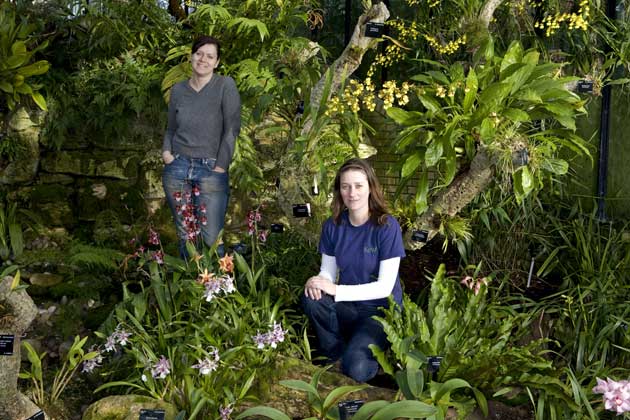Bloom or bust: Kew's queen of the tropics on the secret to giving orchids a second life
Dazzled by Kew Gardens' 250th anniversary orchid spectacular, Emma Townshend has just one question on her mind: why don't mine ever reflower like that?

Your support helps us to tell the story
From reproductive rights to climate change to Big Tech, The Independent is on the ground when the story is developing. Whether it's investigating the financials of Elon Musk's pro-Trump PAC or producing our latest documentary, 'The A Word', which shines a light on the American women fighting for reproductive rights, we know how important it is to parse out the facts from the messaging.
At such a critical moment in US history, we need reporters on the ground. Your donation allows us to keep sending journalists to speak to both sides of the story.
The Independent is trusted by Americans across the entire political spectrum. And unlike many other quality news outlets, we choose not to lock Americans out of our reporting and analysis with paywalls. We believe quality journalism should be available to everyone, paid for by those who can afford it.
Your support makes all the difference.In the Princess of Wales Conservatory at Kew, a neat Korean intern climbs right inside the orchid display and meticulously adjusts each plant by a matter of mere millimetres. Two brawnier helpers are up ladders attaching tropical plants to a dramatic fallen tree. And in the pool, among the Kew piranhas, brave gardeners in waders are arranging 6ft-high birthday presents covered in clown-coloured bromeliads. Whose birthday, you ask? Well, preparations for Kew's Tropical Extravaganza are well under way, with this year's, a celebration of the Royal Botanic Gardens' 250th anniversary, promising to be more outrageously colourful than ever.
Kew holds the most comprehensive and oldest collection of orchids in the world. For Lara Jewitt, head of the orchid section, though, there seems to be just one recurring question that preoccupies the visitors: "How can I get my orchid to reflower?" Orchids grow beautifully for most purchasers in the couple of weeks after they bring them home, but many of us are disappointed at the point where we'd like to see them live a long life.
The problem is that orchids are a family of 28,000 different species, originating in habitats as diverse as seaside scrub and high rainforest. So giving generalised advice, says Jewitt, is tricky to say the least. However, she also points out, most orchids purchased in the UK are large-flowered hybrids of a few species, and she does have some pointers to offer (see box, right).
Jewitt loves her whole collection, picking up one tiny, rare jewel and proclaiming: "This is one of my favourites," before laughingly admitting, "but then I do say that about all of them." Jewitt is the first to suggest that some unfortunate souls will never succeed in reflowering orchids: "Sometimes I think people can either do it or they can't; they've either got the right sort of house, or they haven't."
So for those who are happier seeing orchids in full bloom without having to worry about looking after them, head for Kew, where the Tropical Extravaganza runs from now until 8 March. Jewitt is looking forward to having everything looking absolutely perfect. She even lets me into the secret of the enormous fallen tree I saw being decorated earlier on: it was made by the set designers who created Tracy Island for the 2004 Thunderbirds film, out of a combination of polystyrene and steel-reinforced concrete. "So it won't rot and fall apart in our high humidity," she explains, slightly laughing at herself: "It's my dream come true."
Second thoughts: How to reflower orchids
For cymbidiums
"When they have stopped flowering, put them in the garden in dappled shade," says Jewitt. "Leave them till the first light frost. The cold should initiate flowering."
For phalaenopsis
"They don't need draughts, radiators or sun," says Jewitt, who adds that you can encourage a second lot of flowers if you cut the spent spike back to the third node on the stem, rather than all the way.
For all orchids
"Don't use hard water; use rainwater, filtered water or cooled boiled water from the kettle. Fill the sink, and put the pot in. Let it drain out, then don't water again till the pot is really light. They'll benefit from misting with a sprayer, too."
Kew is running an all-day introductory orchid-growing course on 19 February (to book, call 020 8332 5626), as well as behind-the-scenes tours of the orchid nurseries throughout the festival. For further details, see www.kew.org
Join our commenting forum
Join thought-provoking conversations, follow other Independent readers and see their replies
Comments